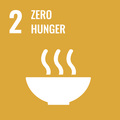2- Zero Hunger

Here are the actions taken by the Université de Montréal to fight hunger and food insecurity in a sustainable way.
Food Bank
The Université de Montréal’s food bank is an independent organization led by students dedicated to fight food insecurity. It relies solely on the generosity of student volunteers, its funding scholarships and its supplier, Moisson Montréal. The food bank operates every Monday during regular business hours in the University’s main cafeteria.
For more information : www.baudem.ca
Sustainable Dining
Farmers’ market and urban agriculture
Urban agriculture at the Université de Montréal was born out of a student initiative that started in 2011 with the creation of P.A.U.S.E. as part of an interdisciplinary graduate-level course. The goal of P.A.U.S.E. is to educate the community on the concept of foster city and food self-sufficiency.
Also, the University’s food services sell homemade products prepared with ingredients grown on campus. Ginger, hibiscus, peppers, herbs, tomatoes, onions, lemon balm and lavender are harvested at various sites on campus, including in a new greenhouse. Lavender is used in the University’s local beer. A project to recover mushroom substrate for use in urban agriculture has also been initiated.
Sustainable food outlets
The University’s ephemeral projects, located on the MIL campus, organize a local food market.
En Vrac, a non-profit organization run by volunteers sells organic food without packaging on campus.
Support for disadvantaged businesses, social enterprises and local SMEs
The production of the University’s beer and kombucha is outsourced to small local businesses.
Vegan dining program
Plant-based options are available throughout campus. The University’s food services offer two vegetarian options (including one plant-based), as well as plant-based sandwiches and salads.
Sustainability labelling
Vegan meals are labelled as “Ve” and vegetarian meals as “V” on the menu of the University’s food services.
The “Aliments du Québec au menu” logo is also displayed on locally farmed meals.
Food recovery competition or commitment program or food waste prevention system
Between May 2019 and March 2020, in partnership with Preserve, a student-based project, and the Unité de développement durable, the University participated in a pilot project aimed at measuring pre- and post-consumption food loss to reduce food waste.
Food donation program
In March 2020, the University’s food services had to dispose of all food inventories due to the mandatory closure of its campus caused by the COVID-19 pandemic. All food was donated to various local organizations that help those in need.
A shared refrigerator was implemented in the student residences and occasional donations are made when there is a food surplus.
Food materials diversion program
The University’s food services divert all frying oils from landfills. They are collected and recycled by an external supplier.
Pre- and post-consumer composting program
In January 2014, the University’s food services implemented a pre- and post-consumer composting program. Compost residues are collected by an external company.
In partnership with the University’s École de design, industrial design students created new units for waste management (compost / cardboard & paper / glass, plastic & metal / cans & bottles / trash).
Students installed several drop points for compost in student cafés.
Reusable tableware program
Since 2010, all meals served by the University’s food services are served in washable and reusable tableware, including metal cutlery.
All the student-managed cafés incentivize the student community to bring their own mug.
Compostable containers and tableware
Coffee cups, covers, plates, utensils and stirrers are certified compostable and available for the cost $0.25. Napkins are also made with recycled paper and certified compostable. A lunch box offered by the University’s catering service is made of recycled and compostable materials.
A reusable cup service from CANOtogo is available in the University’s main cafeteria.
Since 2022, the University’s food services, as part of its catering service, organize events that produce minimal waste when the number of people and the location allow them. When this is not possible, compostable dishes are provided.
For more information : https://www.locallocal.ca/nos-actions-durables
The University’s STARS report card on food and beverage purchasing : https://reports.aashe.org/institutions/university-of-montreal-qc/report/2022-12-23/OP/food-dining/OP-7/
The University’s STARS report card on sustainable dining : reports.aashe.org/institutions/university-of-montreal-qc/report/2022-12-23/OP/food-dining/OP-8/
Fair Trade Campus
The Université de Montréal is currently designated as a fair-trade university.
Documentation affirming the fair-trade designation : https://durable.umontreal.ca/fileadmin/durable/documents/FairTrade_UdeM_2022_renewal_certificate.pdf
The presence of fair-trade products on campus is the result of a close collaboration between the University’s Unité de développement durable and student unions. The Fédération des associations étudiantes du campus de l’Université de Montréal carried out awareness initiatives with its 22 student-run cafés. The Association générale des étudiants et étudiantes de la Faculté de l’éducation permanente worked with the student-owned restaurant La Brunante. A status report on the presence of certified products was then prepared. It was followed by a proposal to include more alternatives to conventional trade.
The University includes a clause that promotes fair-trade in calls for offers to suppliers of its food services.
This process lasted more than a year and allowed the University’s community to have access to many fair-trade products across campus.
Subsequently, a five-year action plan will increase the presence of fair-trade products on campus and an awareness campaign will be carried out. There is also a scholarship to reward student projects related to fair-trade.
For more information : durable.umontreal.ca/campus-durable/campus-equitable-et-solidaire/